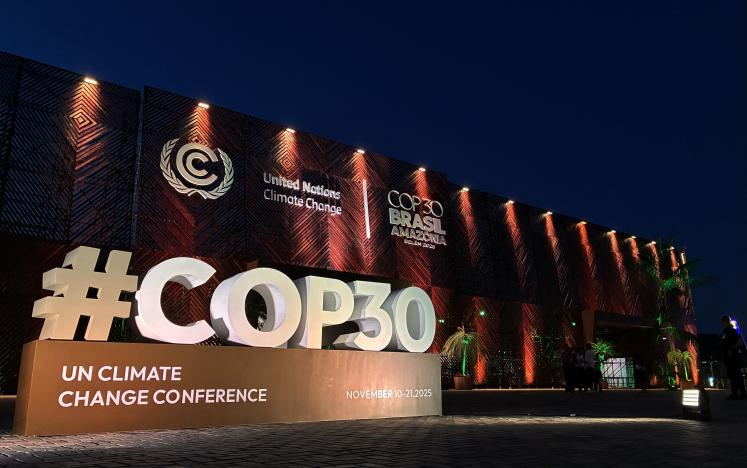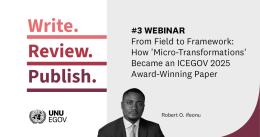As global attention turns to Belém for the 30th UN Climate Change Conference (COP30), UNU-CPR is contributing ideas and evidence to support the global response to the climate crisis. Through research, policy dialogues and partnerships with the COP30 Presidency, UNU-CPR is helping to shape a more coherent, adaptive and equitable global climate architecture.
From fragmented governance to coherent action
UNU-CPR’s engagement at COP30 builds on its collaboration with Brazilian Ambassador André Corrêa do Lago, President of COP30, and his call for a “global mutirão” – a collective effort to move beyond outdated bureaucratic models of climate cooperation. Earlier this year, we hosted Ambassador do Lago at a workshop to explore the creation of a UN Climate Change Council – an idea introduced by President Lula da Silva at last year’s G20 Summit to help accelerate implementation of COP decisions.
UNU-CPR’s Multilateralism UNpacked podcast also featured an in-depth conversation with Ambassador do Lago on how the COP30 Presidency seeks to restore coherence between global climate governance and local implementation, particularly through new mechanisms under the Paris Rulebook and more robust climate finance systems.
That vision will take centre stage at an official side event co-hosted with UNU-CPR partners at the SDG Pavilion in Belém on 19 November, "Toward a Coherent Climate Architecture: Linking Multilateral Reform to Local Resilience." The event will explore innovative governance models that can help local communities operationalize climate adaptation and investigate how multilateral systems can better support locally led resilience. It also provides an opportunity to introduce the Centre’s Global Governance Innovation (GGI) Platform – an initiative launched earlier this year that identifies, explores and visualizes innovative governance practices to serve as templates for new multilateral institutions or inspire reforms to existing ones.
Complexity and innovation in climate governance
Three new UNU-CPR papers – early versions of forthcoming articles in a special feature on COP30 and global climate governance to be published in Global Governance (January/February 2026) – advance new thinking on how to design a more adaptive and effective climate architecture. The papers draw on workshops convened by UNU-CPR under the GGI initiative, with the support of the Governments of Brazil and Germany and the British Academy. They are:
- Beyond the Paris Rulebook: Lessons for Adaptive and Inclusive Climate Governance. Michael Franczak and Khadeeja Naseem examine the institutional “hardware” reforms – rules, mandates, and coordination mechanisms – needed to manage growing climate complexity. They consider proposals for a UN-linked High-Level Climate Commission, an upgraded UNEP as a Global Environment Organization, and a UN Climate Council under the Secretary-General’s authority.
- Complexity as a Catalyst: Enabling Global Environmental Change in a Deeply Divided World. Simon Sharpe and Adam Day show how complexity science can reshape the “software” of global climate governance. They argue that reinforcing feedback loops in clean technology and sectoral transitions can create positive-sum dynamics, reducing the need for universal consensus.
- The Politics of Global Climate Governance Reform. Michael Weisberg and Giovanna Kuele examine the political feasibility of reform across three pathways – internal UNFCCC reforms, hybrid “inside/outside” mechanisms and independent climate councils. Together, these studies shape UNU-CPR’s contribution to debates on the proposed United Nations Climate Change Council.
Financing the transition
Complementing its governance work, UNU-CPR has released papers on climate finance and economic governance reform:
- A Full-Spectrum Approach to Climate Finance outlines five priorities to deliver the Baku–Belém Roadmap for $1.3 trillion in annual climate finance by 2035: reforming multilateral development banks beyond capital expansion; deploying concessional finance catalytically; building country platforms for blended finance; strengthening domestic fiscal capacity; and modernizing regulatory frameworks to reduce risk premiums. By integrating fiscal, monetary and regulatory tools within nationally led systems, the paper argues that climate finance can achieve both macroeconomic stability and climate resilience.
- Lessons from the Post-War Economic Order: Toward a Just Transition Framework situates the current moment in global climate governance within the longer historical arc of post-war economic reconstruction. Drawing on precedents from the Marshall Plan and the creation of Bretton Woods institutions, the paper argues that transformative moments in governance emerge from dynamic “prototypes” that evolve into enduring systems. It offers five lessons for the COP30 Circle of Presidents, including the need to embrace experimental approaches, design finance as a catalyst for confidence, and prepare concrete institutional plans ready to seize political opportunity.




